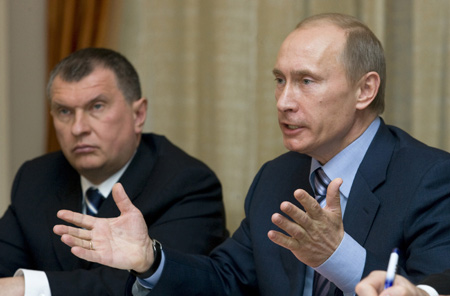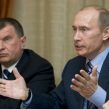
Experiments with Repression in Russia Are Tempered by the Oil Business
Publication: Eurasia Daily Monitor Volume: 9 Issue: 115
By:

Two stories dominated the news-cycle in Moscow last week: the targeted police investigations against several opposition leaders on the eve and in the aftermath of the big rally on June 12, and a high-level silovik’s direct threat against a journalist from Novaya Gazeta. Commentators and bloggers are still arguing about whether these experimental repressions signify the long-predicted turn toward forceful suppression of the protest movements or whether they are merely episodes in the progressing paralysis of the vast repressive apparatus under President Vladimir Putin (Nezavisimaya Gazeta, June 12; Besttoday, June 15). There is, however, a third story that has attracted much less attention because it is developing behind closed doors: The government of Prime Minister Dmitry Medvedev has lost control over energy policy-making (Vedomosti, June 15). This intrigue has no direct connection to the fluid political crisis but might have serious implications for the survivability of Putin’s regime.
The context of the first story is set by the growing anxiety in the Kremlin about the misbehavior of Moscow’s “creative classes,” which translates into the urge to punish the “trend-setters” and scare the rest from partaking in street activities. The result has been predictably counter-productive as more people turned out for the June 12 rally than had been expected before the “turning of the screws.” Meanwhile, the “celebrities” on the receiving end of the punishment feel obliged to demonstrate their defiance (Gazeta.ru, June 12). Alexei Navalny ridiculed the investigators and wrote about another corruption case involving the pro-Kremlin United Russia party; Ilya Yashin refused to answer any questions and posted photos of his vandalized flat after an illegal break-in by police; and Ksenia Sobchak remained cool as a seasoned rebel under pressure (Moscow Echo, June 14-15). The investigators are trying to incriminate the dissidents for not only inciting riots at the May 6 rally but also financial irregularities, using as key evidence the large sum of money found in Sobchak’s flat (Nezavisimaya Gazeta, June 14). Many among the “white ribbons” are very skeptical about the leaders of street protests, but these selective repressions inevitably generate mass support for the “enemies of the state.”
The second story has moved very quickly from a high drama to an anti-climax. Dmitry Muratov, the editor of the liberal Novaya Gazeta, accused Aleksandr Bastyrkin, the chief of the powerful Investigation Committee, of making a direct face-to-face threat to murder a journalist. Bastyrkin flatly rejected the accusation, but then, facing sharp protests from many journalists, opted for an apology citing “emotional stress” (Novaya Gazeta, Moscow Echo, June 15). Many bloggers see this compromise as unsatisfactory. However, an important context of this story is in fact in the North Caucasus where Novaya Gazeta is conducting research into the interplay between corruption and terrorism. Smoldering civil war in this region is all but ignored, but in May alone, 50 people were killed and 114 were wounded (Kavkazsky Uzel, June 14; Lenta.ru, June 15). The new Interior Minister, Vladimir Kolokoltsev, has initiated a major anti-corruption investigation in Kabardino-Balkaria while at the same time reshuffling the key cadre in his own ministry (Moskovskie Novosti, June 15; Newsru.com, June 16). A possible escalation of violence in this turbulent region could add a dangerous new dimension to the brewing Russian revolution.
The only reliable means Putin has for checking the instability in the North Caucasus is by distributing money – which is also his only strategy for containing the protests from spreading to the masses of “have-nots” – and the major source of this money is energy exports. Hence the salience of the third story, the main feature of which is the surprise creation of the presidential commission for strategic development of the fuel and energy sector (Kommersant, June 16). Experts pondered about Igor Sechin’s departure from the government, reckoning that the position of Rosneft chairman is too low for his ambition to control all of the oil and gas business (Forbes.ru, June 13). Putin’s trusted loyalist, Sechin has indeed managed to outmaneuver his rivals, becoming the secretary of the new commission, and also inserting one of his junior aides, Anton Ustinov, into the group of Putin’s advisors (Gazeta.ru, June 15). Now, deputy prime minister Arkady Dvorkovich and Energy Minister Aleksandr Novak have to present their clever ideas about taxing the oil business and privatizing Rosneft to Sechin for vetting. All lobbyists, meanwhile, will be metaphorically camping in Sechin’s anteroom (Moskovskie Novosti, June 14).
This Byzantine degrading of Medvedev’s government signifies not a greater concentration of power in Putin’s hands but a further decline in the quality of state institutions (Vedomosti, June 14). The discourse of “modernization” has become severely compromised as merely a camouflage for the archaic and deeply corrupt system of governance where parochial bureaucratic interests prevail over what little economic sense the “systemic liberals” can master. The pledges to improve the investment climate ring hollow because legal protection of property rights is in principle impossible in a system where “manual management” by the supreme leader is the ultimate method of resolving conflicts. That is where the three stories come together – the arbitrary application of police force against protesters and the heavy pressure on free media are undermining the residual credibility of state institutions as effectively as Sechin’s sleazy handling of oil revenues.
This degeneration of the state is occurring much more quickly than the organization of the opposition into a coherent political force. The moderate leaders of the “white ribbons” are stuck with the dilemma of asserting the illegitimacy of the parliament and the president, while at the same time striving to open a dialogue with the authorities. They know that the rigid predatory bureaucratic system is irreformable – and endeavor to propel its peaceful evolution toward a competitive and responsible government. Putin’s position of defender of the habitual structures of rent-collecting and patronage is more logically consistent, which does not make it sustainable; its resource base is shrinking and lies are becoming intolerable. The quasi-repressions against the pseudo-leaders of the deepening and widening opposition could have an important unintended consequence: They inform the stake-holders in Putinism that the risk of defection is actually rather low, so it is smarter not to wait for an eruption of the infamous Russian “bunt” (mass revolt).




